Can和could的用法和区别
英语情态动词can、may、must的用法
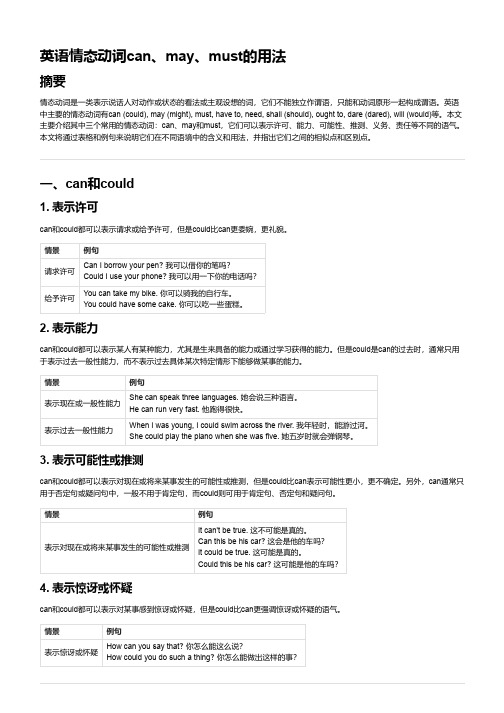
英语情态动词can、may、must的用法摘要情态动词是一类表示说话人对动作或状态的看法或主观设想的词,它们不能独立作谓语,只能和动词原形一起构成谓语。
英语中主要的情态动词有can (could), may (might), must, have to, need, shall (should), ought to, dare (dared), will (would)等。
本文主要介绍其中三个常用的情态动词:can、may和must,它们可以表示许可、能力、可能性、推测、义务、责任等不同的语气。
本文将通过表格和例句来说明它们在不同语境中的含义和用法,并指出它们之间的相似点和区别点。
一、can和could1. 表示许可can和could都可以表示请求或给予许可,但是could比can更委婉,更礼貌。
情景例句请求许可Can I borrow your pen? 我可以借你的笔吗?Could I use your phone? 我可以用一下你的电话吗?给予许可You can take my bike. 你可以骑我的自行车。
You could have some cake. 你可以吃一些蛋糕。
2. 表示能力can和could都可以表示某人有某种能力,尤其是生来具备的能力或通过学习获得的能力。
但是could是can的过去时,通常只用于表示过去一般性能力,而不表示过去具体某次特定情形下能够做某事的能力。
情景例句表示现在或一般性能力She can speak three languages. 她会说三种语言。
He can run very fast. 他跑得很快。
表示过去一般性能力When I was young, I could swim across the river. 我年轻时,能游过河。
She could play the piano when she was five. 她五岁时就会弹钢琴。
3. 表示可能性或推测can和could都可以表示对现在或将来某事发生的可能性或推测,但是could比can表示可能性更小,更不确定。
情态动词can和could 用法详解

情态动词can和could用法详解can和could用法详解1.表示能力,could是can的过去。
如:Can you speak English?你会说英语吗?Could you speak English then?那时候你会说英语吗?2.表示xx,注意以下用法:(1)对于现在或将来的“许可”,要区分以下两种情况:a.表示请求允许(即请求别人允许自己做某事),可用can(=may)或could(=might)(注意:这里的could并不表示过去,而是表示现在,只是语气较委婉)。
如:b.表示给予允许(即自己允许别人做某事),一般只用can(=may),而不能用could或might。
如:A:Could [Can] I use your pen?我可以借用你的钢笔吗?B:Yes, of course you can.当然可以。
(注意:此处不用Yes,you could)(2)对于过去的“许可”,也要区分以下两种情况:a.表示过去一般性允许(即表示某人随时都可以做某事),用can的过去式(即could)。
如:When I lived at home, I could watch TV whenever I wantedto.我住在家里时,想什么时候看电影就可以什么时候看(一般性允许)。
b.表示过去特定的允许(即表示在过去某一特定情况下允许进行某一活动),则不用could,而需换成其它表达(如:had permission或was [were] allowed to)。
如:I was allowed to see the film yesterday evening.昨天晚上允许我去看了电影(特定的允许,所以不能用could)。
3.表示推测:(1)对现在或将来的推测,can通常只用于否定句或疑问句中,一般不用于肯定句:It can’t be true.那不可能是真的。
What can they be doing?他们会在干什么呢?Can it be Jim?那会是吉姆吗?但could(可以表示现在)则可用于肯定句中:We could [may, might] go to Guilin this summer.今年夏天我们可能要去桂林。
北师大版英语七年级上册Unit4 情态动词can和could的用法区别

情态动词can和could的用法区别一、情态动词can的用法1. 表示能力,意思是:能,会。
如:I can't swim. 我不会游泳。
Can you drive?你会开车吗?2. 表示客观可能性,意思是:可以,可能。
如:That big cinema can seat 2,000 people.那家大电影院能坐2000人。
He can be very friendly at times.有时他会很友好。
3. 表示允许(和may意思相近),意思是:可以,能够。
如:You can have the book when I have finished it. 书我看完了可以给你。
Can I use your pen?我可以用你的钢笔吗?4. 表示惊异、不相信等〔用于疑问句、否认句或感慨句中〕,意思是:会,可能。
如:This can't be true. 这不可能是真的。
Can it be true?这可能是真的吗?二、情态动词could的用法1. 表示“能力〞或“可能性〞,作为can的过去形式。
如:Could you speak English then?那时你能讲英语吗?He said he couldn't follow me.他说他跟不上我。
2. 表示惊异、疑心、不相信等情绪。
如:Who could have taken them?谁会把它们拿走了呢?She couldn't have left so soon. 她不可能这么快就走了。
在这种情况下,could和can是可以换用的,用could时口气较缓和,用can时不相信的程度更强一些,两者在时间上没有差异。
3. 比拟委婉客气地提出问题或陈述看法。
如:—Could you let me have your passport?—Yes, here it is.—看看你的护照好吗?—行,这就是。
I could come earlier, if necessary. 如果必要我可以早点来。
初中英语语法情态动词can与could用法“三要点”
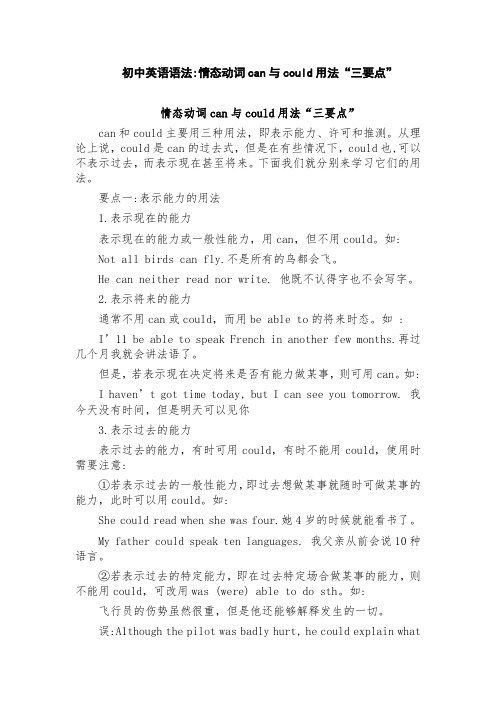
初中英语语法:情态动词can与could用法“三要点”情态动词can与could用法“三要点”can和could主要用三种用法,即表示能力、许可和推测。
从理论上说,could是can的过去式,但是在有些情况下,could也,可以不表示过去,而表示现在甚至将来。
下面我们就分别来学习它们的用法。
要点一:表示能力的用法1.表示现在的能力表示现在的能力或一般性能力,用can,但不用could。
如:Not all birds can fly.不是所有的鸟都会飞。
He can neither read nor write. 他既不认得字也不会写字。
2.表示将来的能力通常不用can或could,而用be able to的将来时态。
如 :I’11 be able to speak French in another few months.再过几个月我就会讲法语了。
但是,若表示现在决定将来是否有能力做某事,则可用can。
如:I haven’t got time today, but I can see you tomorrow. 我今天没有时间,但是明天可以见你3.表示过去的能力表示过去的能力,有时可用could,有时不能用could,使用时需要注意:①若表示过去的一般性能力,即过去想做某事就随时可做某事的能力,此时可以用could。
如:She could read when she was four.她4岁的时候就能看书了。
My father could speak ten languages. 我父亲从前会说10种语言。
②若表示过去的特定能力,即在过去特定场合做某事的能力,则不能用could,可改用was (were) able to do sth。
如:飞行员的伤势虽然很重,但是他还能够解释发生的一切。
误:A1though the pilot was badly hurt, he could explain whathad happened正:Although the pilot was badly hurt, he was able to explain what had happened.句中说的“能够”解释当时所发生的一切,显然是过去特定场合所具有的能力,所以不能用could。
情态动词can和could用法详解
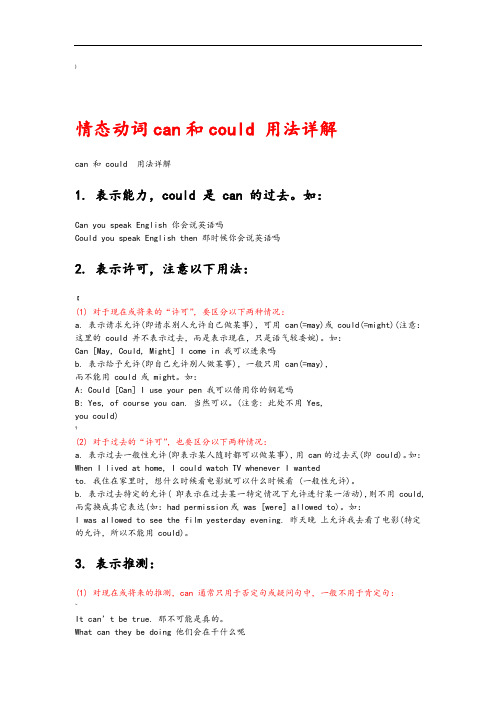
)情态动词can和could 用法详解can 和 could 用法详解1. 表示能力,could 是 can 的过去。
如:Can you speak English 你会说英语吗Could you speak English then 那时候你会说英语吗2. 表示许可,注意以下用法:【(1) 对于现在或将来的“许可”,要区分以下两种情况:a. 表示请求允许(即请求别人允许自己做某事),可用 can(=may)或 could(=might)(注意:这里的 could 并不表示过去,而是表示现在,只是语气较委婉)。
如:Can [May, Could, Might] I come in 我可以进来吗b. 表示给予允许(即自己允许别人做某事),一般只用 can(=may),而不能用 could 或 might。
如:A: Could [Can] I use your pen 我可以借用你的钢笔吗B: Yes, of course you can. 当然可以。
(注意: 此处不用 Yes,you could)?(2) 对于过去的“许可”,也要区分以下两种情况:a. 表示过去一般性允许(即表示某人随时都可以做某事),用 can的过去式(即 could)。
如:When I lived at home, I could watch TV whenever I wantedto. 我住在家里时,想什么时候看电影就可以什么时候看 (一般性允许)。
b. 表示过去特定的允许( 即表示在过去某一特定情况下允许进行某一活动),则不用 could, 而需换成其它表达(如:had permission或 was [were] allowed to)。
如:I was allowed to see the film yesterday evening. 昨天晚上允许我去看了电影(特定的允许,所以不能用 could)。
3. 表示推测:(1) 对现在或将来的推测,can 通常只用于否定句或疑问句中,一般不用于肯定句:~It can’t be true. 那不可能是真的。
can与could的用法详解
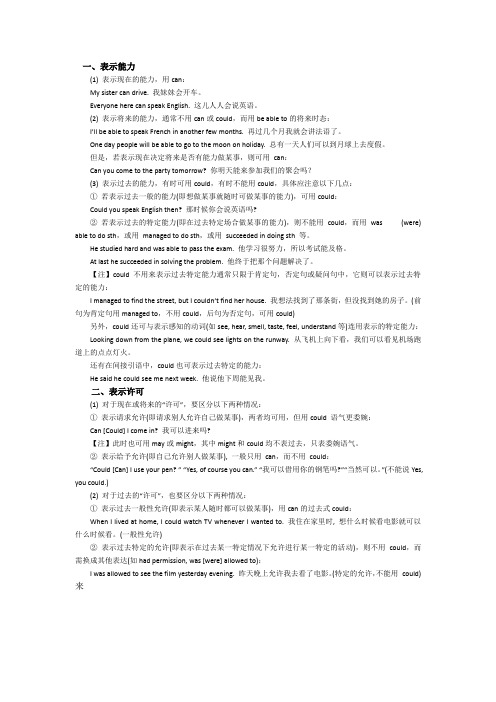
一、表示能力(1) 表示现在的能力,用can:My sister can drive. 我妹妹会开车。
Everyone here can speak English. 这儿人人会说英语。
(2) 表示将来的能力,通常不用can或could,而用be able to的将来时态:I’ll be able to speak French in another few months. 再过几个月我就会讲法语了。
One day people will be able to go to the moon on holiday. 总有一天人们可以到月球上去度假。
但是,若表示现在决定将来是否有能力做某事,则可用can:Can you come to the party tomorrow? 你明天能来参加我们的聚会吗?(3) 表示过去的能力,有时可用could,有时不能用could,具体应注意以下几点:①若表示过去一般的能力(即想做某事就随时可做某事的能力),可用could:Could you speak English then? 那时候你会说英语吗?②若表示过去的特定能力(即在过去特定场合做某事的能力),则不能用could,而用was (were) able to do sth,或用managed to do sth,或用succeeded in doing sth 等。
He studied hard and was able to pass the exam. 他学习很努力,所以考试能及格。
At last he succeeded in solving the problem. 他终于把那个问题解决了。
【注】could 不用来表示过去特定能力通常只限于肯定句,否定句或疑问句中,它则可以表示过去特定的能力:I managed to find the street, but I couldn’t find her house. 我想法找到了那条街,但没找到她的房子。
can 和 could 用法详解
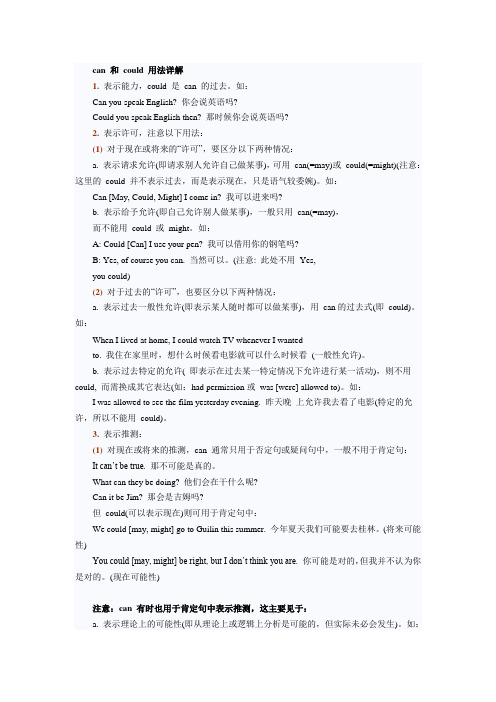
can 和could 用法详解1.表示能力,could 是can 的过去。
如:Can you speak English? 你会说英语吗?Could you speak English then? 那时候你会说英语吗?2.表示许可,注意以下用法:(1) 对于现在或将来的“许可”,要区分以下两种情况:a. 表示请求允许(即请求别人允许自己做某事),可用can(=may)或could(=might)(注意:这里的could 并不表示过去,而是表示现在,只是语气较委婉)。
如:Can [May, Could, Might] I come in? 我可以进来吗?b. 表示给予允许(即自己允许别人做某事),一般只用can(=may),而不能用could 或might。
如:A: Could [Can] I use your pen? 我可以借用你的钢笔吗?B: Yes, of course you can.当然可以。
(注意: 此处不用Yes,you could)(2) 对于过去的“许可”,也要区分以下两种情况:a. 表示过去一般性允许(即表示某人随时都可以做某事),用can的过去式(即could)。
如:When I lived at home, I could watch TV whenever I wantedto. 我住在家里时,想什么时候看电影就可以什么时候看(一般性允许)。
b. 表示过去特定的允许( 即表示在过去某一特定情况下允许进行某一活动),则不用could, 而需换成其它表达(如:had permission或was [were] allowed to)。
如:I was allowed to see the film yesterday evening. 昨天晚上允许我去看了电影(特定的允许,所以不能用could)。
3.表示推测:(1) 对现在或将来的推测,can 通常只用于否定句或疑问句中,一般不用于肯定句:It can’t be true. 那不可能是真的。
can英语单词的用法(精选7篇)

can英语单词的用法(精选7篇)can和could的区别和用法篇一1、表示能力can表示现在的能力,could表示过去的能力,要表示将来具备的能力通常用be able to的将来时态例:He can speak a little English now.She could play the piano when she was five.【注意】:1)could表示过去的能力,通常只用于表示过去一般性能力(即想做事就随时可做事的能力),而不表示过去的特定能力(即在过去特定场合做事的能力)例:Could you speak English then? 那时候你会说英语吗?I couldn't find her house 我找不到她的家了。
2)若表示过去的特定能力,需用was (were) able to dosth/managed to do sth/succeeded in doing sth等例:He studied hard and was able to pass the e某am. 他学习很努力,所以考试能及格。
At last he succeeded in solving the problem. 他终于把那个问题解决了。
3)若在否定句中则没有以上限制,即couldn’t可表示过去特定情况下的能力例:He studied hard but still couldn’t pass the e某am.他学习很努力,但是仍然没通过考试。
2、表示请求许可1)表示现在的允许时① 表示请求允许(即请求别人允许自己做事),两者都可用,could 语气更加委婉客气例:Can i try those shoes on please?Could i try those shoes on please?我能试一下那些鞋子吗?could语气更为委婉② 表示给予允许(即自己允许别人做事),一般只用can,而不用could,主要用于疑问句中(不可用于肯定句中),应答语用can 例:Could you please take out the trash ?你能帮我倒一下垃圾吗?Yes,I can/No,I can't2)表示过去的允许时① 若表示过去一般性允许(即表示人随时都可以做事),用couldWhen I lived at home, I could watch TV whenever I wanted to. 我住在家里时,想什么时候看电影就可以什么时候看(一般性允许)② 若表示在过去其中一特定情况下允许进行其中一特定的活动,则不用couldI was allowed to see the film yesterday evening. 昨天晚上允许我去看了电影。
- 1、下载文档前请自行甄别文档内容的完整性,平台不提供额外的编辑、内容补充、找答案等附加服务。
- 2、"仅部分预览"的文档,不可在线预览部分如存在完整性等问题,可反馈申请退款(可完整预览的文档不适用该条件!)。
- 3、如文档侵犯您的权益,请联系客服反馈,我们会尽快为您处理(人工客服工作时间:9:00-18:30)。
C a n和c o u l d的用法和区别■表示能力:能,能够,会He could swim when he was five.他五岁时就会游泳了。
Can you drive a car你会开车吗?—Yes, I can.我会。
—No, I can’t.我不会。
■表示推测:可能,会I think the work can be completed ahead of time.我认为这项工作能提前完成。
What can he mean他会是什么意思?注:表示推测时,could不是过去式,只是;若是推测已发生的事或过去的情况,用can/could have加。
如:Today is Sunday. He can’t/couldn’t be at school.今天是星期天。
他不可能在学校里。
Mike can’t have found his car, for he came to work by bus this morning.迈克一定还没有找回他的车,因为早上他是坐公共汽车来上班的。
■表示“有时也会”It can be quite windy there, especially in spring.那里有时容易刮风,特别在春季。
■表示允许:可以(口语中常代替may)You can first lend me one book this time.这次你可以先借给我一本书。
You can’t take the book out of the room.你不可以将这本书拿出室外。
注意:1.表示允许别人做某事只能用can,不能用could。
’t和mustn’t一样,都可表示“不准,不允许”。
■表示请求:可以Can I go swimming today, please, mum妈妈,我今天可以去游泳吗?Could you tell me how I can get to the railway station请告诉我去火车站怎么走吗?注意:could不是过去式,只是语气较can更委婉,注意在回答中不可用could。
如:—Could I have the television on我可以开电视看吗?—Yes, you can. / No, you can’t.可以。
/不可以。
■can与be able to的比较(1) be able to比can有更多的时态。
如:In the past 50 years or so, scientists have been able to “see” farther and farther into the sky.在过去50年里,科学家们已经能够往天空看得更远。
(2)在表示过去具体某次能够成功做成某事时,只能用was/were able to。
如:He worked very hard and was able to pass that examination.他学习非常努力他以能够通过了那场考试。
一、情态动词can的用法1. 表示能力,意思是:能,会。
如:I can't swim.我不会游泳。
Can you drive?你会开车吗?2. 表示客观可能性,意思是:可以,可能。
如:That big cinema can seats 2,000 people.那家大电影院能坐2000人。
He can be very friendly at times.有时他会很友好。
3. 表示允许(和may意思相近),意思是:可以,能够。
如:You can have the book when I have finished it.书我看完了可以给你。
Can I use your pen?我可以用你的钢笔吗?4. 表示惊异、不相信等(用于疑问句、否定句或感叹句中),意思是:会,可能。
如:This can't be true.这不可能是真的。
Can it be true?这可能是真的吗?二、情态动词could的用法1. 表示“能力”或“可能性”,作为can的过去形式。
如:Could you speak English then?那时你能讲英语吗?He said he couldn't follow me.他说他跟不上我。
2. 表示惊异、怀疑、不相信等情绪。
如:Who could have taken them?谁会把它们拿走了呢?She couldn't have left so soon.她不可能这么快就走了。
在这种情况下,could和can是可以换用的,用could时口气较缓和,用can时不相信的程度更强一些,两者在时间上没有差别。
3. 比较委婉客气地提出问题或陈述看法。
如:/P>—Could you let me have your passport—Yes, here it is.—看看你的护照好吗?—行,这就是。
I could come earlier, if necessary. 如果必要我可以早点来。
这时could和can没有时间上的差别。
4. 在虚拟条件句中构成谓语。
如:I would certainly do it for you if I could.要是我能做得到,我一定会为你们做这事儿。
How I wish I could go with you!我多么希望和你们一道去!三、can, could和be able to的区别与联系。
1. can的过去式是could,但could 除了可作can的过去式外,还可表比can更委婉的语气,因此在回答由could 表示请求的问句中,不能用could,但可用can。
如:—Could you lend me a hand—Of course I can.2. 在表示现在或过去的智力、体力、技能等方面的“能力”时,can, could 常可与be able to互换。
如:/P>He could (or was able to) swim five miles when he was a boy.3. be able to有比can更多的形式,如"will be able to","have (has) been able to" "had been able to" 等等。
因此be able to常被用来表示can所不能表示的将来或完成的概念。
如:/P>They will be able to run this machine on their own in three months.他们过三个月就能自己开这台机器了。
4. 在表示成功地做了某事时,不用could,而用was / were able to (或managed to, succeeded in doing sth )来表示。
如:He was able to (or managed to) finish the job yesterday。
但是couldn't和wasn't / weren't able to 常可互换。
如:I couldn't / wasn't able to finish the job yesterday.5. 与感觉动词连用时,can,could亦可与be able to互换。
如:We could/were able to smell something burning in the kitchen.will与would的用法■表示意志或意愿:决心,愿意,……好吗?We will do our best to save the child. 我们会尽力抢救这个孩子。
I told her to stop crying, but she just wouldn’t listen. 我叫她别哭,可她就是不愿听。
注:表示请求、建议或征求对方意见时,用Would you…比用Will you…更婉转。
如:Will/Would you please keep the door open请让门开着好吗?Will/Would you go with me你愿意和我一起去吗■表示真理或习惯:惯于,总是Oil will float on water. 没总是浮在水面上。
She will listen to music alone in her room for hours. 他独自在房间里听音乐,一听往往就是几小时。
He would get up early when he lived in the country. 他住在乡下时总是早起。
■表示要求:一定,必须You will report to me afterward. 你稍后一定要向我报告。
■表示猜测:可能,大概This will be the house you’re looking for. 这大概就是你找的那所房子了。
I think he would accept the invitation. 我想他会接受邀请的。
■表示功能:能This auditorium will/would seat one thousand people. 这个礼堂能容纳一千人。
■would like表示愿意I would like to have a word with you. 我想同你说句话。
Would you like a cup of tea 请你喝杯茶好吗?■would rather…than…宁愿……也不愿……I would rather fail than cheat in the examination. 我宁愿考不及格,也不愿意考试作弊。
■would与used to的比较(1) 两者都可以表示过去经常做某事,常可互换。
如:When I was young I used to/would get up early. 我年青时经常早起。
(2) 下列三种情况要用used to,不用would:◇强调与现在的对比时;◇在故事开头时;◇与be, stay, belong, live, like , think, know等状态动词连用时。
如:He doesn’t work hard as he used to. 他不像以前那样努力了。
We used to swim every day when we were children. We would run down to the lake and jump in…我们小时候天天游泳。
我们会跑到湖边,跳进水里……They used to live here, didn’t they 他们以前住在这里,是不是?(3) 与时间段或与表示“有时”意义的sometimes, at times, now and then, from time to time 等连用时,宜用would。
